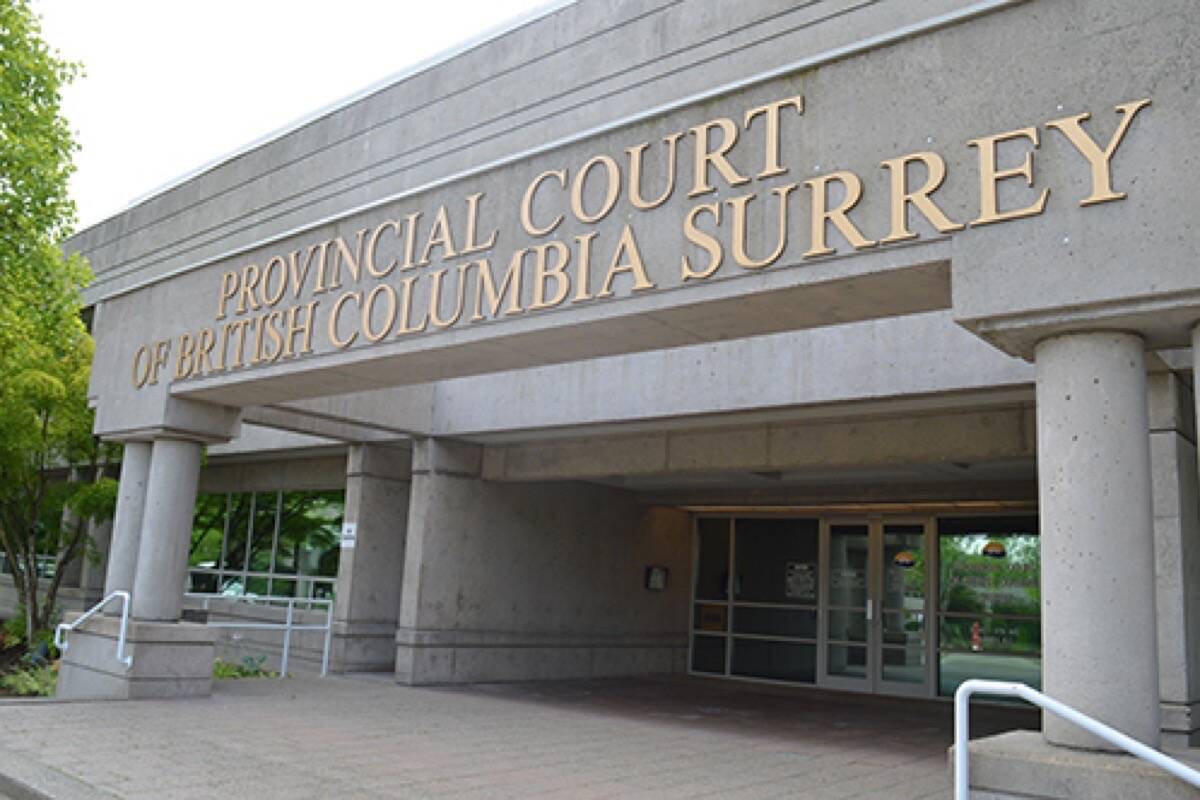A Surrey provincial court judge sentenced a man with an “extremely aggravating” criminal record to two years’ house arrest and probation after police stopped a taxi in Whalley and found an empty bottle of vodka and unloaded modified SKS rifle inside his backpack.
The court heard Owen Reginald Bitternose, 43, had been drinking and “hanging out” with some people outside a hotel on 104 Avenue in Surrey on Nov. 7, 2020. “One of the men he was hanging out with decided to go with him to his place to hang out and continue to drink,” Judge Valliammai Chettiar noted in his Jan. 10 reasons for sentence.
A Surrey Mountie doing traffic patrol at 105A Avenue and King George Boulevard spotted a taxi that was stopped, with its hazard lights on, checked it out and the cabbie told the officer there was an intoxicated man in the backseat, yelling racial slurs and punching the glass divider. The Mountie arrested Bitternose for causing a disturbance and found the unloaded rifle and bottle, but no ammo.
Bitternose pleaded guilty to possessing the gun without a licence and possessing – while already under two lifetime firearms bans – a modified SKS rifle which the defence noted is not a restricted weapon, although its length was shortened.
The Crown sought a federal prison term of two years and a lifetime ban on possessing firearms, while the defence argued for two years less a day of house arrest followed by two years’ probation. Chettiar sentenced him to the latter, as well as a third lifetime firearms ban.
“Mr. Bitternose has spent the better part of his life in jail,” the judge noted. “He appears resolute from the time he was placed on the release order in November 2020 to change his life around. He appears to have made effective use of this time by engaging in self-reflection, making plans for his future, and attending educational programs and counselling to assist in his rehabilitation. It serves no purpose to incarcerate him, adding to the overrepresentation of Indigenous offenders in custody.”
READ ALSO: Surrey driver convicted of leaving crash, knowing people were injured, loses appeal
Bitternose is to keep a 9 p.m. to 6 a.m. curfew for the first 12 months, is not to drink alcohol or use drugs without a prescription, enter liquor stores, pubs, nightclubs or beer gardens, and must undergo counselling.
“The defence agrees with the Crown that deterrence, denunciation and protection of the public are important sentencing principles in this case, but emphasizes that equally important is Mr. Bitternose’s rehabilitation. I agree,” Chettiar decided.
The court heard Bitternose’s sister was murdered in 2019, his mother died in 2000 or 2001 from cirrhosis as a result of chronic alcoholism, and his father died in 2021 from Covid-19.
“Multiple generations of Mr. Bitternose’s family attended the Gordon’s Indian Residential School, including his grandparents, parents, brother and himself,” Chettiar noted, adding Bitternose spent a “significant part” of his adulthood in federal prison in Quebec, Alberta and Saskatchewan.
“He has an unenviable criminal record. The Crown points out that Mr. Bitternose has been convicted of an offence at least once a year since 1996. Mr. Bitternose’s offences gradually escalated from property and driving related offences to more serious and violent offences, including aggravated assault, assaulting a peace officer, robbery, and discharging a firearm with intent,” the judge added. “At the time of the index offences, Mr. Bitternose was already on two mandatory lifetime firearm bans.”
READ ALSO: Surrey golf centre robber loses appeal
Chettiar noted the Crown opposed the conditional sentence given Bitternose’s “significant criminal record and public safety concerns.”
“The Crown says Mr. Bitternose has an extremely aggravating record with serious offences, including aggravated assault, assault of a peace officer, robbery, and discharge of a firearm with intent; he has been under a s. 109 prohibition order since 1999, and yet he was found in possession of the rifle in a taxi, in a public place, when he had been out of custody for only approximately six months; and the fact that he was intoxicated, while in possession of the rifle in a public place adds to his recklessness.”
The defence argued that the Supreme Court of Canada “calls upon judges to use a different method of analysis in determining a fit sentence” for Indigenous offenders, the judge noted, and that the principles of denunciation and deterrence could be satisfied by a conditional sentence order (house arrest).
“I am not satisfied that Mr. Bitternose intentionally took the risk of possessing the rifle in a public place,” the judge concluded. “Mr. Bitternose was highly intoxicated during the incident, and was in the company of other likely unsavory people. He does not know how he came into possession of the rifle. The rifle was not loaded, and no one was harmed during the incident.”
READ ALSO: Surrey meth trafficker’s 15-year prison sentence upheld
Chettiar noted the courts must take into account “such matters as the history of colonialism, displacement, and residential schools and how that history continues to translate into lower educational attainment, lower incomes, higher unemployment, higher rates of substance abuse and suicide, and of course higher levels of incarceration for Aboriginal peoples.
“These matters, on their own, do not necessarily justify a different sentence for Aboriginal offenders,” the judge continued. “Rather, they provide the necessary context for understanding and evaluating the case-specific information presented by counsel.”
tom.zytaruk@surreynowleader.com
Like us on Facebook Follow us on Instagram and follow Tom on Twitter

